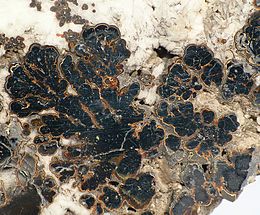Jordanite
| Jordanite | |
|---|---|
 | |
| General | |
| Category | Sulfosalt minerals |
| Formula (repeating unit) | Pb14(As,Sb)6S23 |
| IMA symbol | Jrd[1] |
| Strunz classification | 2.JB.30a |
| Crystal system | Monoclinic |
| Crystal class | Prismatic (2/m) (same H-M symbol) |
| Space group | P21/m |
| Identification | |
| Colour | Lead-grey |
| Cleavage | Perfect |
| Fracture | Conchoidal |
| Tenacity | Brittle |
| Mohs scale hardness | 3 |
| Lustre | Metallic |
| Streak | Black |
| Density | 6.4 |
| Pleochroism | Visible |
Jordanite is a sulfosalt mineral with chemical formula Pb14(As,Sb)6S23 in the monoclinic crystal system,[2] named after the German scientist H. Jordan (1808–1887) who discovered it in 1864.
Lead-grey in colour (frequently displaying an iridescent tarnish), its streak is black and its lustre is metallic. Jordanite has a hardness of 3 on Mohs scale, has a density of approximately 6.4, and a conchoidal fracture.[2]
The type locality is the Lengenbach Quarry in the Binn Valley, Wallis, Switzerland.[2]
References[edit]
- ^ Warr, L.N. (2021). "IMA–CNMNC approved mineral symbols". Mineralogical Magazine. 85 (3): 291–320. Bibcode:2021MinM...85..291W. doi:10.1180/mgm.2021.43. S2CID 235729616.
- ^ a b c Mindat information page for Jordanite
Wikimedia Commons has media related to Jordanite.
